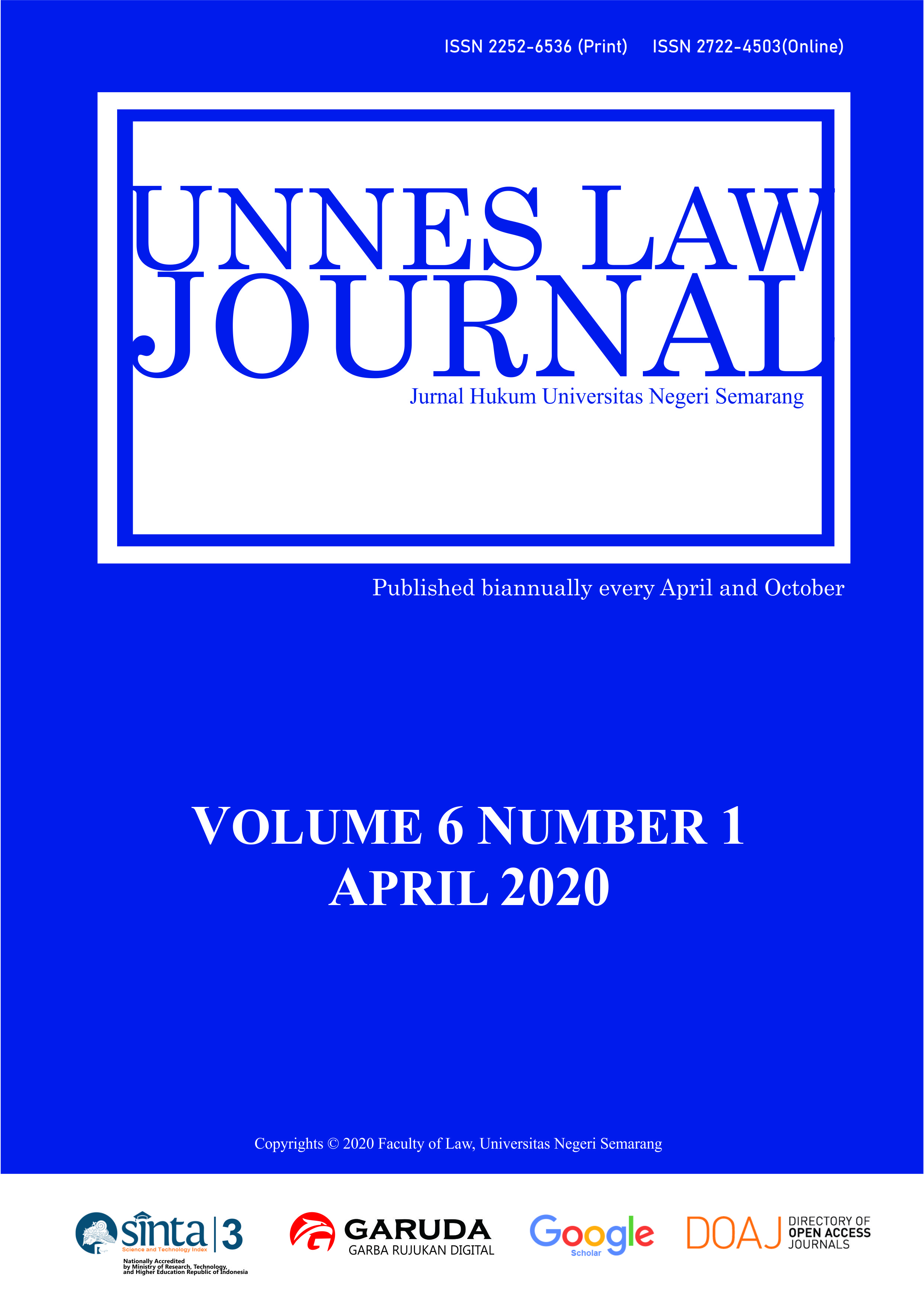Regional Revenue and Expenditures Budget Transparency in the Context of Regional Financial Law Regional Financial Law, Regional Autonomy Law,
Main Article Content
Abstract
This research aims to describe the transparency of the use of the Semarang City Regional Revenue and Expenditure Budget and discover the forms, mechanisms and constraints in obtaining transparency of information on the use of the Semarang City Revenue and Expenditure Budget, this research uses a sociological juridical research type approach method, by using primary data and secondary data which are then analyzed using qualitative data analysis.The results of the study can be seen that the transparency of the use of the Semarang City Regional Revenue and Expenditure Budget already has internal regulations in the form of Mayor Regulation number 26 of 2012 and forms and mechanisms in accordance with Law number 14 of 2008 although internal and external obstacles are still found that result implementation is less than optimal so that it inhibits the realization of good governance (good governance). The conclusions from the results of the study show that the transparency of the use of the Semarang City Regional Revenue and Expenditure Budget is in accordance with Law number 14 of 2008 and already has forms and internal mechanisms, although in the implementation phase there are still obstacles both internally and externally.
Article Details
References
Aritonang, A. I. (2011). Kebijakan Komunikasi di Indonesia: Gambaran Implementasi UU No. 14 tahun 2008 tentang Keterbukaan Informasi Publik. Jurnal ASPIKOM 1(3), 261-278.
Aryani, D. et.al. (2015). Putusan Komisi Informasi dalam Bingkai Hukum Progresif. Jakarta: Komisi Informasi Pusat RI.
Astomo, P. (2014). Penerapan Prinsip-Prinsip Pemerintahan Yang Baik dalam Penyelenggaraan Pemerintah. Kanun Jurnal Ilmu Hukum 64(16), 401-420.
Bangun, J., Purnama, E., & Saleh, M. (2019). Ruang Lingkup Kewenangan Komisi Informasi Aceh dalam Menyelesaikan Sengketa Informasi Publik di Aceh. Syiah Kuala Law Journal 3(2), 250-265.
Bisri, Z. (2012). Partisipasi Politik dalam Keterbukaan Informasi Publik: Studi Kasus Interaksi Pattiro dengan Pemerintah Kota Semarang. Politika: Jurnal Ilmu Politik 3(1), 47-55.
Cahyaningtyas, C. K., & Herawati, N. R. (2017). Persepsi Masyarakat Terhadap Keterbukaan Informasi Publik di Kota Semarang, Studi Kasus: Masyarakat Pengguna Pusat Informasi Publik (PIP) Tahun 2017. Journal of Politic and Government Studies 6(4), 141-150.
Erdianto, K., Aryani, D., & Karanicolas, M. (2012). Implementasi Hak Atas Informasi Publik. Jakarta: Centre for Law and Democracy Yayasan Dua Puluh Delapan.
Febriananingsih, N. (2012). Keterbukaan informasi publik dalam pemerintahan terbuka menuju tata pemerintahan yang baik. Jurnal Rechts Vinding: Media Pembinaan Hukum Nasional 1(1), 135-156.
Jolosangoro, S. (2014). Peran LSM Pattiro Semarang Mendorong Dinas Pendidikan Kota Semarang Untuk Mewujudkan Keterbukaan Informasi Publik. Journal of Politic and Government Studies 3(3), 286-295.
Lubis, M., Kusumasari, T. F., & Hakim, L. (2018). The Indonesia Public Information Disclosure Act (UU-KIP): Its Challenges and Responses. International Journal of Electrical & Computer Engineering 8(1), 94-103. http://doi.org/10.11591/ijece.v8i1.pp94-103.
Moleong, L. J. (2004). Metodologi Penelitian Kualitatif. Bandung: Remaja Rosdakarya.
Mughis, A. (2019). Keterbukaan Publik di Pemkot Semarang Masih Setengah Hati, Informasi Proyek Ditutup-tutupi, Jateng Today, 24 April, https://jatengtoday.com/keterbukaan-publik-di-pemkot-semarang-masih-setengah-hati-informasi-proyek-ditutup-tutupi-22169.
Personal Interview (2018) Personal Interview with Wulan (Public Relations Staff of Semarang City Government), 2018 April.
Prabowo, R. D., Manar, D. G., & Adhi, A. (2014). Implementasi Undang-Undang Keterbukaan Informasi Publik dalam Upaya Mewujudkan Good Governance (Kajian Tiga Badan Publik: Bappeda, DPKAD dan Dinas Pendidikan Kota Semarang). Journal of Politic and Government Studies, 3(3), 187-195. https://ejournal3.undip.ac.id/index.php/jpgs/article/view/5600/5401.
Prasetyo, T. (2019). Penyelesaian Sengketa Keterbukaan Informasi Publik di Pengadilan Tata Usaha Negara Semarang. Jurnal Spektrum Hukum 13(2), 238-261.
Ramdhani, A., & Ramdhani, M. A. (2017). Konsep umum pelaksanaan kebijakan publik. Jurnal Publik 11(1), 1-12.
Retnowati, E. (2012). Keterbukaan Informasi Publik dan Good Governance (Antara Das Sein Dan Das Sollen)â€, Perspektif, 17(1), 54-61. http://dx.doi.org/10.30742/perspektif.v17i1.94.
Rifai, A. (2008). Kemerdekaan Informasi: Catatan atas Undang-Undang Keterbukaan Informasi Publik. Jurnal Dakwah 9(2), 101-115.
Rochman, G.M. (2000). Good Governance, Prinsip, Komponen,dan Penerapanya dalam Hak Asasi Manusia (Penyelenggaraan Negara Yang Baik). Jakarta: Komnas HAM.
Rose, M. (2004). Democratizing information and communication by implementing e-government in Indonesian regional government. The International Information & Library Review 36(3), 219-226.
Setiaman, A., Sugiana, D., & Mahameruaji, J. M. (2013). Implementasi kebijakan keterbukaan informasi publik. Jurnal Kajian Komunikasi 1(2), 196-205.
Shiu, E. et al. (2015). The direct and moderating influences of individual-level cultural values within web engagement: A multi-country analysis of a public information website. Journal of Business Research 68(3), 534-541.
Sørum, H., Andersen, K. N., & Vatrapu, R. (2012). Public websites and human–computer interaction: an empirical study of measurement of website quality and user satisfaction. Behaviour & Information Technology 31(7), 697-706.
Subagyo, H. et.al. (2009). Anotasi UU Nomor 14 Tahun 2008 Tentang Keterbukaan Informasi Publik. Jakarta: Komisi Informasi Pusat RI.
Wasistiono, S. (2003). Kapita Selekta Manajemen Pemerintahan Daerah. Bandung: CV Fokusmedia.
Widodo, J. (2001). Good Governance. Surabaya: Insan Cendekia.
Widjajanto, B., Purwanto, Y., & Rijati, N. Analisis Layanan Informasi Publik Pada Website Pemerintah Provinsi Jawa Tengah. SEMNASTEKNOMEDIA ONLINE 3(1), 3-4.
